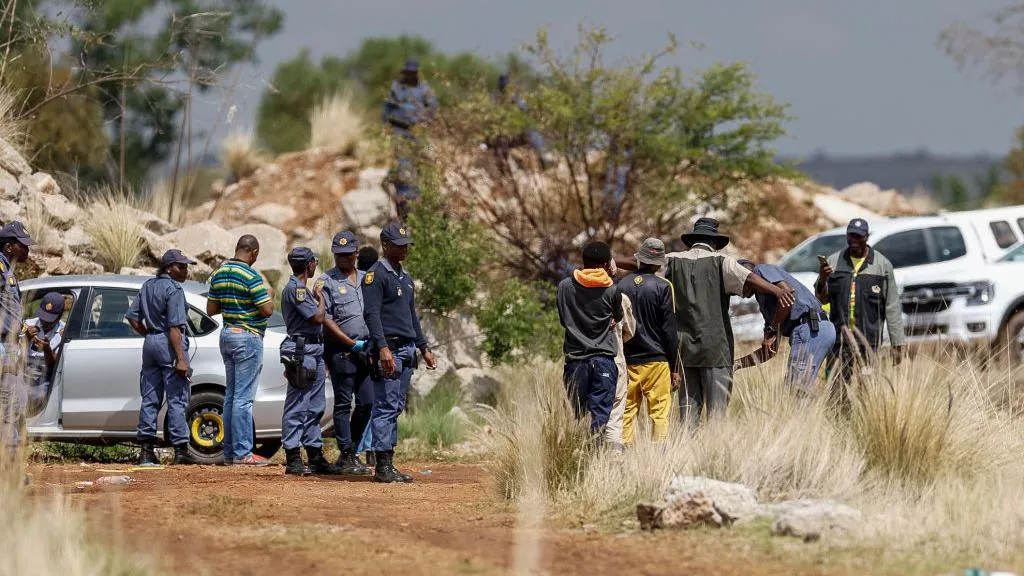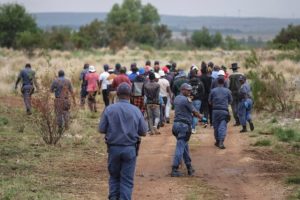South Africa cuts supplies to thousands of illegal miners hiding underground
4 min read
South Africa is facing a dramatic standoff between the government and thousands of illegal miners, known locally as zama zama (which means “take a chance” in Zulu), who have been hiding underground in an abandoned mineshaft in Stilfontein, a town in the North West province. Authorities have cut off food and water supplies to try to force the miners to surrender. Many of them, some of whom have been underground for over a month, are undocumented migrants from neighboring countries like Lesotho and Mozambique.
The Miners’ Struggle
An estimated 4,000 illegal miners are believed to be trapped in the shaft. These miners, often fleeing poverty, risk their lives by working in hazardous, abandoned mines, hoping to extract gold that they sell on the black market. The practice has grown in recent years as formal mining jobs have become scarce in South Africa. Many of the miners, desperate for a means of survival, endure months underground, facing extreme conditions, including limited access to food, water, and safety.
Some miners are part of criminal syndicates, which use illegal mining as a front for various illicit activities, including smuggling and weapon trading. The authorities are concerned that some miners may be armed and hesitant to emerge. Despite this, police have maintained a tight perimeter around the mine, blocking exits and preventing aid from reaching the miners. Local residents have attempted to send food and water down to the miners using ropes, but the government has refused, stating that criminals should not be aided.
Government Response: “Smoke Them Out”
The South African government’s response to the illegal miners has been firm. Minister in the Presidency Khumbudzo Ntshavheni stated that the miners would be “smoked out,” making it clear that no help would be offered to those involved in criminal activities. The operation, called Vala Umgodi (which translates to “Close the Hole”), is aimed at ending illegal mining, which costs the South African government hundreds of millions of dollars annually in lost revenue.
While some miners have emerged from the shaft to surrender, many are refusing to come out, partly out of fear of arrest and deportation. Some of them are undocumented migrants who are fearful of being sent back to their home countries. To date, over 1,000 miners have been pulled from the mine, but many are frail and weak after spending weeks or months underground. Paramedics have been called to attend to their medical needs before they are taken into police custody.
The situation underground is dire, with reports of decomposing bodies being pulled out of the shaft by local volunteers. Community leader Thembile Botman described the scene as traumatic, with the stench of death lingering in the air. Although some supplies have been sent down by residents, the government’s policy has been to prevent assistance, viewing the miners as criminals rather than victims of poverty.

Mixed Reactions and Humanitarian Concerns
The government’s stance has sparked mixed reactions from South Africans. Some praise the decisive action, arguing that illegal mining is a significant issue that should be dealt with firmly. “Finally, our government is not tiptoeing on these serious matters,” one person wrote on social media. Supporters of the operation believe that decisive action is necessary to restore order and prevent further damage to the country’s mining industry.
However, there are strong criticisms of the government’s approach, with many arguing that the miners, particularly those from poorer communities, should not be treated as criminals but as victims of systemic poverty. Human rights advocates, including Busi Thabane from the Benchmarks Foundation, have called the situation a humanitarian crisis. Thabane argues that the miners’ actions are a desperate attempt to survive in an economy with few opportunities. She also expressed concern that the government’s actions may violate basic human rights, particularly the right to life, as the miners are being deprived of essential supplies.
The South African Human Rights Commission has indicated that it will investigate whether the government’s actions have breached the miners’ rights, particularly with regard to depriving them of food and water. The Commission’s statement reflects growing concern that while the government is justified in targeting criminal activities, the methods being used may cross ethical and legal boundaries.
The Economics of Illegal Mining
Illegal mining, while devastating to the environment and dangerous for the miners themselves, has become a lucrative business. The high value of South Africa’s mineral resources, including gold and diamonds, has led to an underground economy of illegal miners who risk their lives for a share of these resources. The practice is often linked to criminal gangs, who exert control over the mines and contribute to rising violence and insecurity in mining communities.
In recent months, the police have seized firearms, thousands of bullets, uncut diamonds, and large sums of money from illegal miners, showing the extent of organized crime linked to illegal mining activities. Authorities are working to dismantle these criminal networks, but the larger issue of unemployment and poverty remains unresolved. Many miners say they turn to illegal mining because it is the only way they know to support their families.
Conclusion
The standoff at the Stilfontein mineshaft illustrates the complex and multifaceted issue of illegal mining in South Africa. While the government is determined to stop the practice, the operation’s harsh methods have raised serious ethical questions about the treatment of the miners, many of whom are simply trying to survive in a system that has left them with few options. As South Africa grapples with its economic and social challenges, finding a sustainable solution that addresses both the root causes of illegal mining and the need for law enforcement will be crucial in resolving this crisis.






